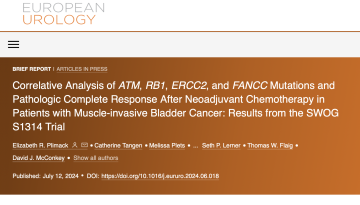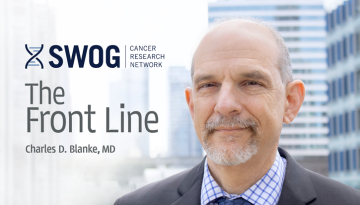Welcoming a New Patient Advocate Leadership Team
The past few months have proven to be a busy season for announcing leadership transitions within SWOG. Today, I get to bring forward not just one but two outstanding new committee chair appointments – and both to the same committee!
The incoming leaders of our patient advocate committee are co-chair-appointees Anne Marie Mercurio and Barbara Segarra-Vazquez, DHSc. The two will share leadership of the group when our current patient advocate chair and vice-chair – Rick Bangs and Hildy Dillon – reach the end of their second and final terms in those roles, at the close of our fall group meeting.
Anne Marie and Barbara have outlined a compelling vision for taking what I believe is already the premier patient advocate program in the NCTN to an even higher level.
“We have witnessed tremendous growth of the PAC under Rick and Hildy’s leadership,” the two said in a joint statement. “The group is highly talented and we are eager to develop plans with our PAC colleagues to continue supporting SWOG trials throughout their entire trajectory.
“With DEI initiatives at the forefront of the clinical trials landscape and the push for the decentralization of trials, we look forward to working beside the PAC, and with current and incoming leadership, to fulfill the promise of bringing SWOG studies within reach of every person who might wish to participate.”
The focus on these two priorities of enhancing diversity and decentralizing trials plays entirely to the complementary strengths and skills of this new leadership pair.
Making the face of SWOG trials – both those who participate in them and those who conduct them – more representative of the full diversity of the patient population at large has always been a central goal of Barbara’s advocacy work with SWOG.
And making more extensive and effective use of digital tools – wearable technology, remote data reporting, telehealth platforms – to streamline and decentralize clinical trials while also recognizing disparities and working to narrow the digital divide, has long been a passion of Anne Marie’s.
A founding member of our digital engagement committee, Anne Marie first became widely known in the cancer survivor community for her Chemobrainfog blog and, subsequently, for her pioneering presence on Twitter, where she continues to chart new ground for patient research advocacy in oncology and serves as a key conduit between the medical and patient communities.
Barbara is patient advocate with SWOG’s cancer care delivery committee, and is a professor at the University of Puerto Rico Medical Sciences Campus, where she previously served as dean of the School of Health Professions and where she’s PI of an R25 training program for young investigators funded by the National Center on Minority Health and Health Disparities.
Twitter habitues may remember seeing photos of her last spring at the White House, where she was an invited panelist at the Cancer Moonshot Goals Forum, or of her posing with the First Lady at another event to promote cancer research, where she of course made the case for patient advocacy and the need for a wide range of voices to be heard.
This fall’s changing of the guard will be the patient advocate committee’s first leadership team turnover. To help ease the transition, Rick and Hildy will serve as chair- and vice-chair-emeriti until next spring.
I couldn’t be happier with the prospect of this leadership team at the helm of our patient advocate program going forward. The committee is a vital one within SWOG and intersects every one of our committees and research endeavors. So, consider this an invitation – an urging, really – to get to know our incoming advocate leadership team.
________________________________________________________________
Trial of the Week
S2210: A Phase II Study of Neoadjuvant Carboplatin for Localized, High-Risk Prostate Cancer with Germline BRCA1/2 Mutations
S2210 is the tenth trial SWOG has activated in 2023. It’s a single-arm study testing the benefit of adding neoadjuvant chemotherapy in treating patients who have high-risk prostate cancer and an inherited mutation in the BRCA1 or BRCA2 gene.
The study asks whether single-agent carboplatin given before radical prostatectomy can achieve a pathologic complete response rate (assessed by local pathology review) of at least 30 percent in these patients.
NCCN guidelines now recommend germline genetic testing for men with localized high-risk prostate cancer. If that testing finds a BRCA1 or BRCA2 mutation, check whether your patient meets the other eligibility requirements for S2210.
The trial activated just this week, so you can still be among the first sites to open it!
The study chair is Heather H. Cheng, MD, PhD, of the Fred Hutchinson Cancer Center.
Learn more at the SWOG S2210 page or the CTSU S2210 page.
Other Recent Stories



